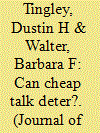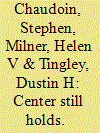|
|
|
Sort Order |
|
|
|
Items / Page
|
|
|
|
|
|
|
| Srl | Item |
| 1 |
ID:
109936


|
|
|
|
|
| Publication |
2011.
|
| Summary/Abstract |
What effect does cheap talk have on behavior in an entry-deterrence game? We shed light on this question using incentivized laboratory experiments of the strategic interaction between defenders and potential entrants. Our results suggest that cheap talk can have a substantial impact on the behavior of both the target and the speaker. By sending costless threats to potential entrants, defenders are able to deter opponents in early periods of play. Moreover, after issuing threats, defenders become more eager to fight. We offer a number of different explanations for this behavior. These results bring fresh evidence about the potential importance of costless verbal communication to the field of international relations.
|
|
|
|
|
|
|
|
|
|
|
|
|
|
|
|
| 2 |
ID:
097755


|
|
|
|
|
| Publication |
2010.
|
| Summary/Abstract |
Recent research, including an article by Charles Kupchan and Peter Trubowitz in this journal, has argued that the United States' long-standing foreign policy orientation of liberal internationalism has been in serious decline because of rising domestic partisan divisions. A reanalysis of the theoretical logic driving these arguments and the empirical evidence used to support them suggests a different conclusion. Extant evidence on congressional roll call voting and public opinion surveys, which is often used to support the claim that liberal internationalism has declined, as well as new evidence about partisan divisions in Congress using policy gridlock and cosponsorship data from other studies of American politics do not demonstrate the decline in bipartisanship in foreign policy that conventional wisdom suggests. The data also do not show evidence of a Vietnam War or a post-Cold War effect on domestic partisan divisions on foreign policy. Contrary to the claims of recent literature, the data show that growing domestic political divisions over foreign policy have not made liberal internationalism impossible. It persists as a possible grand strategy for the United States in part because of globalization pressures.
|
|
|
|
|
|
|
|
|
|
|
|
|
|
|
|
| 3 |
ID:
103892


|
|
|
|
|
| Publication |
2011.
|
| Summary/Abstract |
What effect does repeated play have on reputation building? The literature on international relations remains divided on whether, when, and how reputation matters in both interstate and intrastate conflict. We examine reputation building through a series of incentivized laboratory experiments. Using comparative statics from a repeated entry-deterrence game, we isolate how incentives for reputation building should change as the number of entrants changes. We find that subjects in our experiments generally build reputations and that those investments pay off, but we also find that some subjects did not react to incentives to build reputation in ways our model had predicted. In order to explain this, we focus on the heterogeneity of preferences and cognitive abilities that may exist in any population. Our research suggests that rational-choice scholars of international relations and those using more psychologically based explanations have more common ground than previously articulated.
|
|
|
|
|
|
|
|
|
|
|
|
|
|
|
|
| 4 |
ID:
102538


|
|
|
|
|
| Publication |
2011.
|
| Summary/Abstract |
In this article we bring together opposing international relations theories to better understand U.S. foreign policy, in particular foreign trade and aid. Using votes in the U.S. House of Representatives from 1979-2004, we explore different theoretical predictions about preferences for foreign economic policy. We assess the impact of domestic factors, namely political economy and ideological preferences, versus foreign policy pressures. Our three main results highlight the differential effect of these factors in the two issue areas. First, aid preferences are as affected by domestic political economy factors as are trade preferences. Second, trade preferences, but not economic aid ones, are shaped by the president's foreign policy concerns; for economic aid, domestic political economy factors matter more than foreign policy ones. Third, aid preferences are shaped more by ideological factors than are trade ones, but ideology plays a different substantive role in each. Different constituencies support aid and trade. This finding has implications for foreign policy substitutability, "the internationalist coalition" in U.S. foreign policy, "statist" theories of foreign policy, and the connection between public opinion and legislative voting.
|
|
|
|
|
|
|
|
|
|
|
|
|
|
|
|
|
|
|
|
|